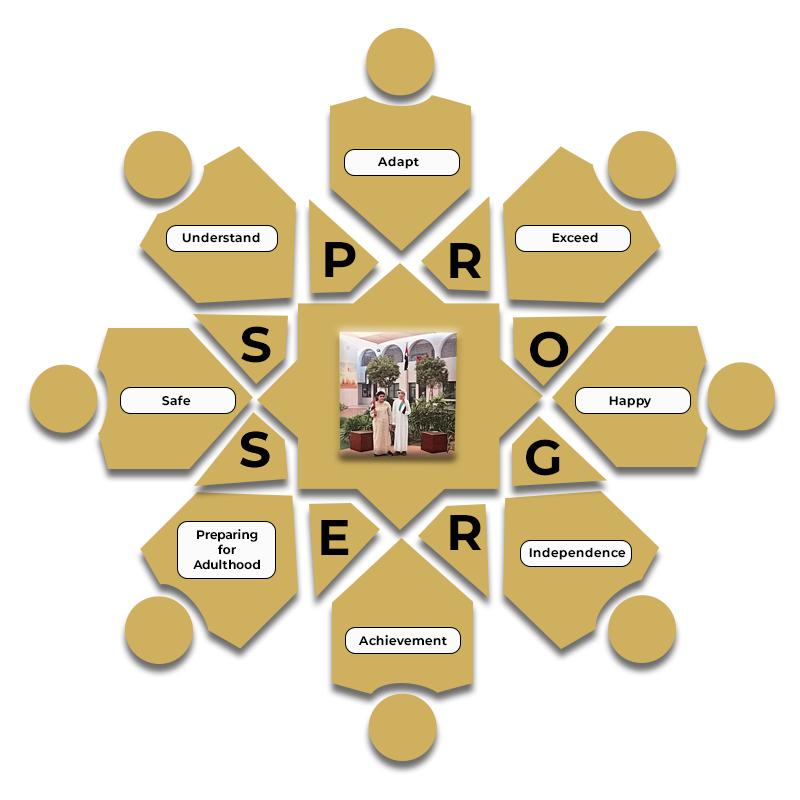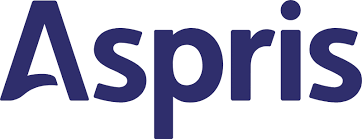Curriculum Overview
‘Education must enable students to understand the world around them and the talents within them so that they can become fulfilled individuals and active, compassionate citizens’. Sir Ken Robinson
AL KARAMAH VISION
To provide the highest quality education and care in a safe and positive environment that enables each young person to achieve their potential.
AL KARAMAH MISSION
Al Karamah School is creating a world of possibilities, supporting student achievement, enjoyment, and wellbeing through enriching, nurturing, and high quality education.
Our Curriculum Aims
Our curriculum has the child at the centre of everything we do. We want our students to be:
- Safe and happy.
- Supported to achieve the very best outcomes
- Prepared for Adulthood
- As independent as possible
- Building Emirate culture

Our Approach
Where possible students are grouped according to their age. This means that class groups are mixed in terms of students’ ability which creates diverse learning environments. In this way students can act as models for communication whilst instilling acceptance and understanding.
The Education Health and Care Plan (EHCP) sits at the centre of our offer. We are able to identify the needs of each child and personalize their learning with the help of our multi-disciplinary team which is led by teachers. We want our students to learn the knowledge and skills which will help them lead a fulfilled and meaningful like and this includes having access to a broad and balanced curriculum which includes the following:
- Communication and literacy (in Arabic and English)
- Islamic Education and Moral and Social Studies
- Maths and finance
- ICT
We also provide opportunities for vocational learning which will enable the students to develop valuable skills in readiness for work experience. Where it is appropriate, we will ensure that accreditation is pursued.
Young people with a greater complexity of needs will undertake a study programme that balances opportunities for social inclusion and therapeutic intervention.
Supporting meaningful and relevant integration into the local community will be embedded within the curriculum offer; with opportunities being personalised to ensure expectations are appropriately aspirational.
Our Curriculum Model
Our curriculum is carefully sequenced at three strands:
- Understand
- Adapt
- Exceed
The Understand Curriculum Strand
Our Understand curriculum (U) is a unique and exclusively therapeutic strand of our whole school curriculum. Our intention is to get to know the student well so that our therapy team can support the academic staff in enabling the student to access learning with the greatest chance of academic and social success.
We provide a fully joined up approach where student progress and teaching and learning are at the forefront of our decision making. Therapists supporting Teachers is essential to this.
On entry into the school all students will enter the U curriculum for up to a 2-week period. During the two-week period the therapy team including Speech and Language Therapy (SALT) and Occupational Therapy (OT) will work with the teacher and the student directly to establish their communication levels, before the student is fully integrated into the classroom. The Therapy team will then work to support the class team to enable the student to be admitted into the classroom alongside their peers. The Assistant Headteachers (AHT’s), in collaboration with the Teacher and Therapists, will make the final decision about when children are ready to transition into classes and when Therapists can transition out. Therapy transition into the class is unlikely to last longer than a week – any longer than this would indicate that we do not yet understand the child well enough for them to be accessing our Adapt curriculum.
We know that therapy is important to support learning and should not be provided instead of it. Therefore, whilst students are in the Understand strand of our curriculum, they will access the same learning that their similar aged peers will be doing – this will require Therapists to liaise with the teacher who will remain responsible for the students’ academic learning
There are 3 routes into our Understand curriculum:
- Route 1: Students who are new to us will all benefit from a period of up to 2 weeks where Therapists will work directly with the child outside of the class – the teacher will visit regularly to oversee learning, and the therapist will ensure that a full understanding of the child’s needs is established. This will enable the student’s communication strategies to be understood and will result in a plan being produced by the therapist to support the student and the teacher in the class. Teaching Assistants will be required to attend meetings regularly to ensure that they get to know the child and the child gets to know them before transitioning into the classroom. Following the 2-week period the Therapists will initially work with the student in the class to ensure that the class staff are fully supported to embed the strategies identified. In this way, the students joining us have the best chance of success. Therapists will stay with the child and will slowly withdraw from the class as the child becomes settled. This communication strategy will also be shared with parents via the SENCO to enable a full home school, consistent approach.
- Route 2: Some students may become very unsettled in school and in their classes. An example of this could be the demonstration of behaviour that challenges. Students who are struggling can be referred by AHT to the Vice Principal/Principal for consideration of a therapeutic intervention period. This can only happen after the AHT’s have satisfied themselves that all the universal strategies have been implemented (such as visual support, appropriately pitched learning etc) This will be a short phase of time (up to 2 weeks) where Therapists will work directly with the child outside of the classroom to help regulate their emotions. Again, Teaching Assistants must attend this session to build relationships and to learn any proposed strategies. The Therapists will then work collaboratively with Teachers to enable the child to reintegrate back into the class. The Therapist will slowly withdraw once all the suggested strategies are being implemented and are being effective. It will remain the responsibility of the AHT in collaboration with the Teacher to determine when therapy support can be withdrawn. Therapy transition into the class is unlikely to last longer than a week – any longer than this would indicate that we do not yet understand the child well enough for them to be accessing our Adapt If the child remains unsettled the therapeutic intervention may need to continue outside of the classroom. Any period of longer than 2 weeks requires further authorisation from the VP/Principal via the AHT.
- Route 3: Some students may not yet be ready for subject specific learning and may need a wholly therapeutic approach. The number of children in this route are expected to be very few in number. AHT’s will work collaboratively with the therapy team but only the VP/Principal can authorise any child staying in this curriculum.
The Adapt Curriculum Strand
Our Adapt curriculum is our whole school curriculum. Once we have got to know the students well, they will work alongside their peers in their assigned class with academic staff to enable them to make progress through our prescribed curriculum following agreed timetables. Therapy will be embedded within the lesson and students will be taught by academic staff. It will be very rare that students are taught by Therapists although the impact of their support will be very clear in every classroom.
This fully integrated approach enables students to make progress and ensures that teaching and learning are at the forefront of our decision making.
Following their 2-week period of observations and support information being gathered, all students will follow the Adapt Curriculum. All students will have personalised, visual timetables to support their learning and that all teachers will follow the prescribed curriculum. The therapists will support with this and ensure that the teachers are fully secure in their usage. Senior Therapists and AHTs will consistently monitor to provide support where needed if suggested strategies are not implemented.
Therapy will be important to support learning but should not be provided instead of it. Therefore, if teachers are facing any particular challenges in respect of student behaviour for example, the therapy team will work alongside the teacher in the classroom to ensure that all strategies are fully embedded and are effective. If they are not effective, then senior therapists will work directly in the classroom to support. Only in exceptional circumstances, recommended by AHTs and authorised by Principal/VP will the student be removed in order to access the more therapeutic environment of the U curriculum.
All students will access our Adapt curriculum.
The purpose of our Adapt curriculum is to enable students to develop their Communication and literacy skills, Maths and Finance skills and will begin to form connections across other areas of the curriculum which will prepare them for their next stages. They will have access to high staffing ratios who will support them in developing academically and socially. Therapy practices will be embedded within the classroom to enable the students to make progress. We will ensure that our students have a voice, are heard and are safe.
Students will have access to communication and literacy, maths and finance, physical development, PSHE, Arabic, Islamic and social studies as well as preparation for adulthood. Not all subjects will be taught discreetly as this further enhances opportunities for connections across the curriculum to be made.
Students following our Adapt curriculum will have their personalised EHCP targets embedded within their lessons and will be supported by a carefully sequenced pattern of learning that allows them to build securely on that which has come before. In our classes, students will be supported to display appropriate behaviours via self (and where needed supported) regulation which prepares them for adulthood. Our teams will work collaboratively to enable this to happen.
All students following our Adapt curriculum will have access to work placements either internally or externally once they reach 16.
Some students may stay in our Adapt curriculum for their time with us, but most students who stay with us will progress to our Exceed curriculum.
The Exceed Curriculum Strand
Our Exceed curriculum builds on and continues to develop the skills and knowledge from the Adapt curriculum but also promotes life skills and vocational opportunities for our older students in AKTI. Here they are supported to gain externally accredited outcomes and where possible experience the world of work. We continue to prepare the students for when they leave us as adults and take opportunities to embed their learning in multiple contexts including in the community.
Students following our Exceed curriculum have the same access to therapeutic support embedded in their lessons where teachers will continue to have access to therapy support whenever it is needed.
Organisation
Our timetables are divided into 7 areas:
- Communication and Literacy: Speaking and Listening, Communication, Reading and Writing.
- Maths and Finances: Number, Using and Applying maths, Shape, Space and Measure
- Physical Development: Physical Education, development, health and wellbeing
- The Wider World: Technologies, Humanities, Computing and Science
- Creativity: Music, Art and Drama
- Independence and Futures: Careers, employability, health and wellbeing
- Arabic, Islamic and Moral and Social Studies



